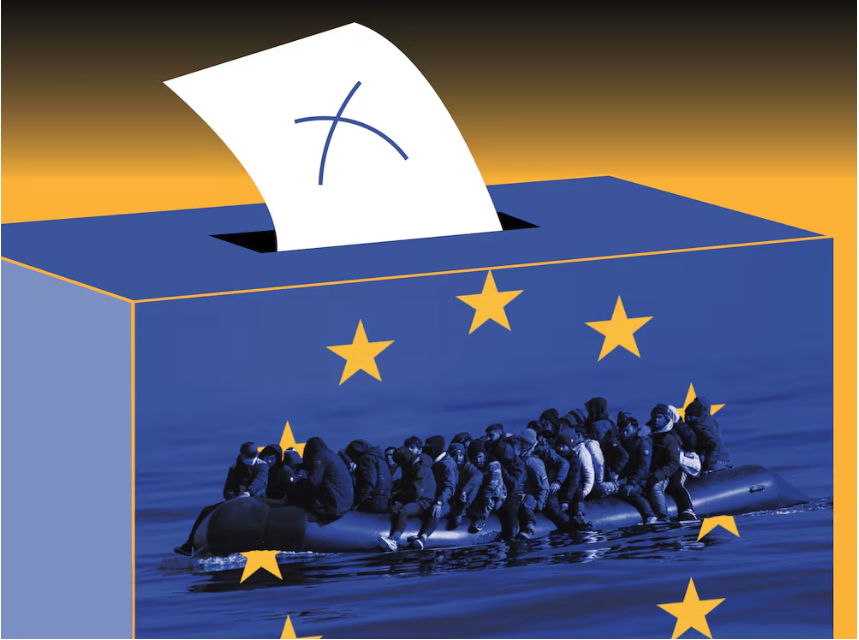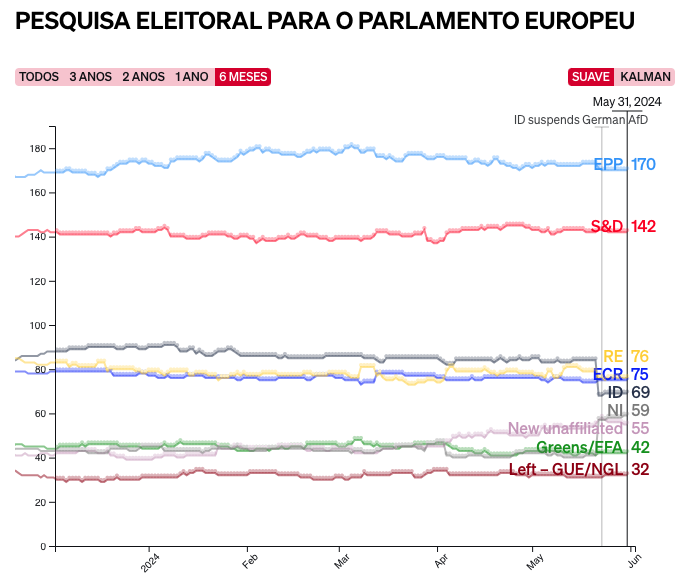
Published 02/06/2024 11:10 | Edited 02/06/2024 11:16
The elections for the European Parliament, which take place from June 6th to 9th, between Thursday and Sunday, promise to be one of the most polarized in recent times. With 705 MEPs to be elected for five-year terms, the composition of the parliament will be formed not by nationality, but by political affinity. This election takes place at a time of great political and social tensions, reflecting a Europe deeply divided and concerned about the advance of right-wing extremist forces.
Analysts, such as Ana Prestes, Secretary of International Relations at PCdoB, highlight that the extreme right could become the fourth force in parliament, reflecting a worrying shift to the right that recalls the dark 1920s and 1930s in Europe, which culminated in the 2nd. World War.
Polls indicate that far-right anti-EU parties have a strong chance of increasing their number of seats, which could mark a significant advance for these ideologies.
Ana Prestes highlighted the fragmentation of the left in the European Parliament, with many groups and internal disputes. “The left is very divided, there are some who have vetoes, so they cannot sit together… There is a huge dispute within the left and, in this, the extreme right and the right are advancing,” said Prestes. This internal division contrasts with the unity found on the far right, which has capitalized on popular discontent with issues such as immigration and security.
Immigration is a central theme. Europe is facing an intense migration flow from countries in the Indian subcontinent and Central Asia, which has fueled anti-immigration rhetoric from far-right parties. The war in Ukraine also plays a significant role, with Russia, led by Vladimir Putin, provoking insecurity and fear in Europe.
Among the main groups of MEPs brought together by ideological affinity, the following stand out:
- European People’s Party (EPP): center-right.
- European Conservatives and Reformists (ECR): right-wing.
- Identity and Democracy (ID): far right.
- Renew Europe (RE): center and center-right.
- Nordic Green Left (GUE/NGL): radical left.
- Greens/European Free Alliance (Greens/EFA): center-left and left.
- Progressive Alliance of Socialists and Democrats (S&D): center-left.

Advance of the far right
European voters face a complex scenario, with several crucial issues at stake. Among them, the war in Ukraine and trade tension with China are prominent. These concerns are reflected in statements by French President Emmanuel Macron, who recently stated: “Our Europe cannot die.” Macron expressed his fear about the possible rise of the far right, highlighting the risk of a war between Europe and Russia, as well as a growing fascination with authoritarianism in European democracies.
The growth of the far right is an alarming reality. In Portugal, the Chega party, led by André Ventura, has gained strength. Ventura, a former law professor and foul-mouthed football commentator, has become an icon of the Portuguese far right, leading his party to a significant position in parliament.
In France, the Le Pen family continues to influence politics, with Marine Le Pen and Éric Zemmour representing a considerable force. In Italy, the far right is hegemonic and has stifled the left, and in Spain, parties like Vox evoke a Francoist heritage. This phenomenon is evident across Europe, with far-right parties exploiting issues such as immigration and national security to gain support.
Global impact and repercussions in Brazil
The European elections have a significant global impact. The rise of the far right in Europe could further complicate the international scenario, especially for Brazil. In a hypothetical scenario where Donald Trump returned to the presidency of the United States, Brazil, with its center-left government led by Lula, could face major diplomatic and economic challenges.
Ana Prestes, international analyst, highlights the complexity of the elections: “A lot of people to vote in the ballot box and after the post-election it’s a whole soap opera too, the composition of the groups and having in the middle of it all the issue of Ukraine, the issue of Palestine, the United States elections, China, which is also a key factor in this issue.”
Europe is experiencing a political and social drama without recent precedents. The advance of the far right, migratory tensions, and the Russian military threat make up an explosive scenario that could define the future of the continent in the coming years. The outcome of these elections will not only shape the European Parliament, but will also influence global geopolitical dynamics, directly affecting countries like Brazil.
Source: vermelho.org.br

